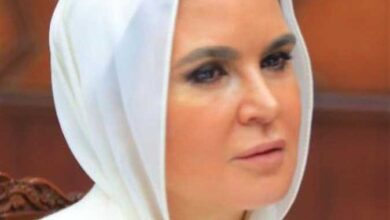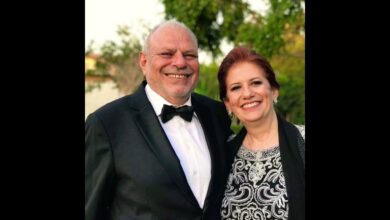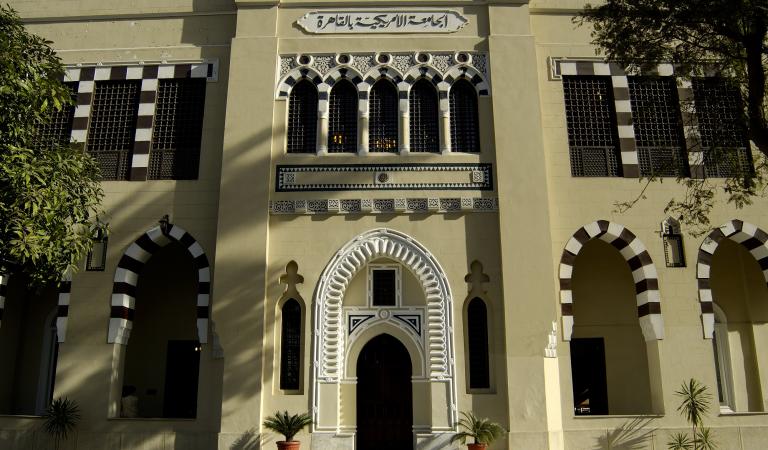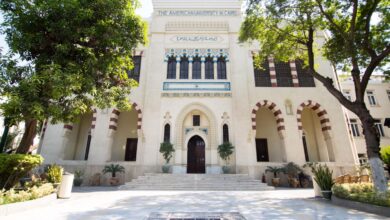What first drew him to the translation profession, says Humphrey Davies, was the fact that it was “a way of learning, of putting oneself in others’ shoes.” His numerous and acclaimed translations include Alaa Al Aswany’s The Yacoubian Building, Elias Khoury’s The Gate of the Sun, and Baha’ Taher’s Sunset Oasis. Davies spoke at the American University in Cairo (AUC) on 8 February as part of a lecture series sponsored by the newly-established Center for Translation Studies.
This was the second lecture in the “In Translation” series, which kicked off on 13 December, 2009 with a talk by the famous Denys Johnson-Davies, translator of Naguib Mahfouz, Tawfiq Al Hakim, Tayyeb Saleh and other great twentieth-century Arab writers.
At the series’ inaugural lecture, literature professor and center head Samia Mehrez said the center’s main aim was to “contribute to Egypt’s cultural and intellectual life through the formation of a new generation of translation theorists, researchers and practitioners.”
Starting next year, the center will begin offering a one-year diploma and a two-year master’s degree. It will also sponsor workshops and seminars for translators. The “In Translation” lecture series, meanwhile, is intended to nurture an ongoing dialog about the theory and practice of translation.
Of the roughly one million books published worldwide every year, some ten percent are books in translation. Of these, only one percent is translated from Arabic. Most Arabic literary translations remain confined to what Johnson-Davies calls “the academic cupboard”–generally printed by university presses for those readers with a specific interest in the Middle East. Until recently, Naguib Mahfouz–winner of the 1988 Nobel Prize for Literature–was probably the only Arab writer whose name might be familiar to Western readers.
Recently, however, this has changed somewhat. “Translations from Arabic are clearly more in demand than they were,” says Davies. Arabic literature in translation, he added, had “started to gain traction” in the international book market in recent years. Following the international success of The Yacoubian Building, other works translated from Arabic–such as Khaled Al Khamissi’s Taxi and Rajaa Alsanea’s Girls of Riyadh–have also done well in the West.
Davies studied Arabic at Cambridge and at AUC’s Center for Arabic Studies Abroad. He has worked for a number of NGOs in Egypt, Palestine, Sudan and Tunisia. He also collaborated on the El-Said Badawi Dictionary of Egyptian Arabic–an experience, he says, which imbued him with “respect for colloquial Arabic.” In 1997, he turned to translation, on which he subsequently “became hooked.”
He credits his diversity of experience and education with his development as a translator, encouraging aspiring translators to take an omnivorous approach: “Translate advertisements, sub-titles, directions on medicine bottles–everything is grist for your mill, you learn from everything,” he says.
In his earlier lecture, Johnson-Davies, 88, noted that, when he first began translating Arabic novels, “There was no publishing house in London employing anyone interested in modern Arabic literature or capable of reading a word of Arabic.” He was never paid upfront to carry out a translation, he said, recalling that the translator "just had to do the work and hope he’d make something out of it.”
The situation for Davies–arguably the foremost translator of his generation after Johnson-Davies-is different. Davies recalls being asked by a publisher: “You don’t expect to make a living at this, do you?” Now, he says, he is happy to be able to answer the question in the affirmative.
"But thank heavens for the AUC Press,” Davies adds, noting that the local publisher had a mandate to translate “a steady stream of books” and that “profit is not the main motive” in its choices. For some time, the AUC Press has been one of the only publishers of contemporary Arabic literature in English, having so far published some 150 such titles. In 1996, the AUC Press established the Naguib Mahfouz Medal for Literature, a prize that includes a promise to translate the winning work into English.
Now, other regional initiatives are following suit. One of the goals of the recently established International Prize for Arabic Fiction (IPAF)–also known as “the Arab Booker”–is to highlight contemporary Arabic literature and encourage its translation into English. Both the 2008 and 2009 winners–Baha’ Taher’s Sunset Oasis and Youssef Zidan’s Azazeel–have both since been translated into English.
With the new center, AUC is clearly hoping to capitalize on its historical role–and on the great number of writers and translators in Cairo–to remain a nexus point in an increasingly dynamic regional cultural scene. It also hopes to maintain its position as a pioneer in the field of translation studies, in which, as Mehrez notes, “interest has never been stronger.”
This certainly appeared to be the case at Davies’ crowded lecture. After his talk, he answered questions such as: How do you choose the works you translate? (“It’s what turns you on. It’s an instinctive gut feeling that I like a book”); Who is your ideal reader? (“Someone like myself”); Do you think there are untranslatable texts? (“Someone once said there are only texts that haven’t found their translator yet.”)
Upcoming lectures in the “In Translation” series will be by Jonathan Wright (translator of Taxi, The Madman of Freedom Square and Azazeel) on 10 March and by novelist Ahdaf Soueif (translator of Mourid Barghouti’s I Saw Ramallah) on 28 April.




